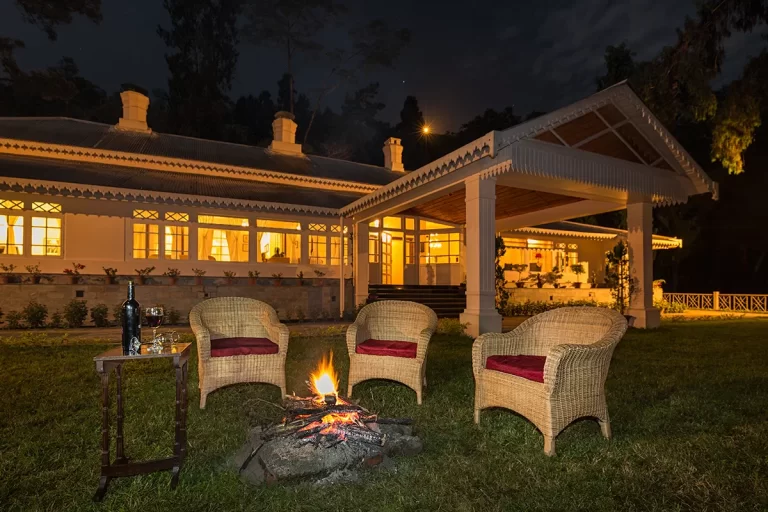Responsible/Sustainable Tourism
Glenburn Tea Estate is a member of the Rainforest Alliance and is a participant in the Ethical Tea Partnership, a non-profit organisation whose aim is to improve the sustainability of the tea sector and regulate the living and working conditions on tea estates. This boutique hotel has been the recipient of the Gold Award for Responsible Tourism in 2020; and have scored 100% in community relations, and wildlife protection by the Rainforest Alliance.
No Single Use Plastic: Safe filtered drinking water is available in glass bottles. There is minimal use of single use plastic in use and there is focussed attempt to further reduce its usage. Bamboo toiletries that include toothbrushes, pens, razors and straws are available in the bathrooms. Bottles are refilled and recycled and are working towards eco-friendly packaging options, having replaced plastic soap covering with a paper box.
Safe Garbage Disposal: As Glenburn is certified by Rainforest Alliance strict guidelines for waste management are followed. Vermiculture is practiced to create vermicompost and grow organic herbs on plots and many gardens around the hotel.
Waste is separated and recycled, sold, reused or composted as per the material. Waste metal and glass is taken off the property and sold. Bin liners are attached to the bin, and are reused them by transferring the rubbish and not the plastic bag to the larger refuse collection point. Bin liners are not used in guest rooms, instead the inside of the bin is washed and sanitized before the next guest arrives.
Water Conservation: Water recycling measures are in place. Watering holes are maintained to attract barking deer and local animals.
Energy Efficiency: The Glenburn Lodge and Campsite by the river uses lamps instead of electricity. The rooms at the Estate are bright and airy and the weather appropriate thus reducing the need for electrical appliances for cooling.
Nature and Biological Diversity Conservation: Conservation of the 1,600 acres of private forest, tea fields and two rivers that run through our estate is a priority. Sustainable methods of farming are used to protect the tea estate for future generations. The Estate is also working to preserve the Golden Mahseer in the rivers as a structured and official programme with long term goals on increasing numbers for this endangered species which are being threatened by local malpractices of dynamiting, electrocution and poisoning of the rivers.
At the Darjeeling Tea Estate the process to convert to organic production began a few years ago by slowly reducing use of chemical pesticides, as well as adopting organic farming techniques such as the use of vermiculture, organic manure (bought from their workers’ cattle), herbal pesticides, and biofungicides. Every year 2% of tea fields are uprooted and replanted. This helps rehabilitate the soil, and reduce the average age of tea bushes, thus optimizing the crop. The uprooted tea bushes are issued as free firewood by the workers, who use it as cooking fuel in their homes.
Local Community Engagement: Deeply engaged with the local community around, the staff are from the local villages and the tea plantation supports numerous families that live within the Estate. A team of teaching volunteers are funded by the Glenburn Workers’ Welfare Trust to help in the local government primary schools in the morning during school hours and run reading libraries in the villages. in the afternoons. The Glenburn Kalakendra (Music and Dance Academy) helps preserve the local Nepali traditions and supports private education of local children through guest donations.
Light Footprint Tourism: Glenburn locally sources produce; and has its own organic garden for ingredients such as fruit, vegetables, herbs and spices used in jams, preserves, marmalades and cuisine. The menus comprise of interesting local fare and traditional Indian dishes, to exotic South-East Asian delicacies, making full use of the produce.
Sensitive Destination Discovery: Hiking within the 1600 acres of Glenburn Tea Estate, minimizes the use of jeeps and cars within the estate.
Heritage Preservation: The original hotel bungalow at Glenburn Tea Estate is over 100 years old, and is being preserved with sensitive maintenance that preserves its heritage value.
Human Touch: Glenburn supports training and upskilling of its staff and community. Members of the tea estate receive subsidised rations and free medical treatment. The Glenburn Estate Foundation supports the private education of local children as well as provides support for the local government primary schools. Every member of the tea estate receives subsidised rations, free medical treatment, clothing and many other benefits. The hotel indirectly supports the local economy and the financial health of the tea estate and its local community along with their extended family members.
